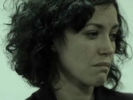Eye For Film >> Movies >> Earthling (2010) Film Review
The iconic no-budget sci fi movie, John Carpenter’s 1974 debut Dark Star, purported to have been made in a garage. Writer/director Clay Liford has similar financial restraints, which he overcomes with superior filmmaking skills and a fiercely committed performance from Rebecca Spence, as Judith, a history teacher, suffering from what might appear to be a nervous breakdown, after the loss of her unborn child, or something entirely different, connected in some inexplicable way to a fatal malfunction inside a manned satellite.
On another level this might not be rated as sci fi, being closer in spirit to earthbound thrillers, such as Invasion Of The Body Snatchers. Whatever is happening to Judith, including the growth of tumour-like lumps on her forehead, is a mystery to her and, since this is told from her p.o.v, becomes a mystery to us, too.

A new girl, called Abby (Amelia Turner), older than the rest, unexpectedly joins her class. There is an immediate affinity. Judith feels it and instinctively backs off. Could this be a sexual attraction – Judith’s relationship with her lapdog husband has nosedived into dysfunction – or might there be a deeper, stranger connection? Abby has the baby antler bumps on her forehead also and says she is there to protect Judith. From what?
If there is a flaw in this absorbing film it concerns comprehension. What the hell (you ask yourself) is going on? And why? And how? In the real world of coincidence and logic there has to be meaning in order to contain the terror that naturally arises from unnatural occurances.
Judith loses it. The head of school asks her if everything is alright. She lies. “You’re working with kids,” he reminds her. “One wrong thing. You know what it is.” She loses it and absorbs it and by embracing the fear discovers another way. Suddenly, for a brief moment, she understands, but the truth, if indeed there is a truth, is too difficult to translate into rational thought.
Liford is uncompromising, like Tarkovsky was. Questioning existence is one thing, discovering an alternative quite another.
Reviewed on: 28 Apr 2010
















